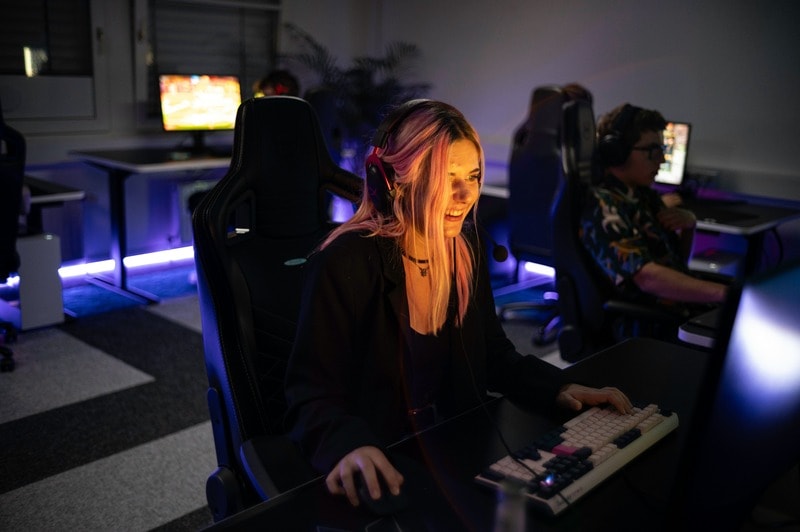These days, games are no longer just a form of entertainment. Thanks to some pretty impressive research highlighting the benefits of making learning fun, the ‘gamification’ of daily life shows no sign of abating. Every day, games are being used in education, workplace training and professional development settings as powerful tools for gaining knowledge – and we’re only really scratching the surface of what’s possible in this space.
Game-based education blends the immersive qualities of games with instructional design, helping players develop skills in critical thinking, problem solving and collaboration. From primary schools and universities to large corporations and government bodies, games are now being embraced as a legitimate method for delivering training, building skills and assessing performance.
Here we explore the growing role of games in education and training and discover how game developers are creating exciting experiences, making the learning process more interactive and engaging for students.
If you’re interested in upskilling in game design and being part of this rapidly evolving space, SAE offers three gaming degree options to launch your career in the industry. Contact our friendly team today for more information.
WHY ARE GAMES SUCH EFFECTIVE LEARNING TOOLS?
One of the key reasons games are so effective in education is because they transform passive learning into active participation. Instead of simply reading or listening, learners interact with content, make decisions and see the outcomes of their actions in real time, creating a feedback loop to enhance learning. This technique is essential for developing long-term memory and a deeper understanding of subjects.
Games are also incredibly versatile. They can simulate complex environments, adapt to a learner’s skill level and deliver personalised experiences. In classrooms, this can mean better engagement with difficult subjects like mathematics or science. In workplaces, it can mean more effective training for high-risk tasks, such as emergency response or surgical procedures.
Educational games also support the development of soft skills, such as communication, leadership, collaboration and emotional intelligence by putting players in scenarios that require these attributes. This is particularly valuable in team-based games, where problem solving and decision making often happen in real time. So, it stands to reason that upskilling in game design can provide experience and tools applicable to any career in the industry.
GAME DESIGN WITH LEARNING IN MIND
Designing games for educational purposes isn’t just about fun – it’s about creating useful experiences to encourage a player’s understanding of various subjects. Game designers working in this space need to strike a careful balance between gameplay and tutoring. If the game is too focused on education, it might feel boring. If it’s too focused on fun, the learning outcomes can get lost.
By studying SAE’s Game Design degree, you’ll develop a deep understanding of game mechanics, player psychology and narrative design. These essential elements will help you craft educational games with impact. You’ll explore how to guide a player’s journey through well-structured challenges and learn how to build systems that reward curiosity, persistence and active participation. As more industries adopt game-based solutions, from mental health to environmental education, the demand for skilled designers who can build meaningful game experiences is growing rapidly.
BRINGING WORLDS TO LIFE
To educate effectively, games must capture the player’s imagination. Visual storytelling and aesthetic design play a huge role in how a game is perceived and how the player engages with it. A compelling game world can spark curiosity, sustain attention and make abstract ideas feel tangible. Whether you’re working on a colourful kids’ game to teach literacy or a complex emergency simulation to train police officers, strong visual design is critical for complete comprehension.
This is where expert game art and animation come in. Intuitive UI elements such as diagrams, infographics and 3D models simplify complex topics, making them more accessible for younger audiences or those with learning difficulties. With our Game Art and Animation degree, you’ll learn how to build visually stunning environments, design relatable characters and use animation to enhance gameplay and learning experiences.
THE ROLE OF PROGRAMMING IN EDUCATIONAL GAMES
From programming mechanics to track user progress and designing features to adjust difficulty levels based on player performance, game programmers play a vital role in shaping how educational games are delivered.
Our Games Programming degree will equip you with the skills to create responsive, dynamic and technically sound games. You’ll learn programming languages used in both commercial and educational game development, including C++ and C#, and gain experience with tools such as Unity and Unreal.
WHERE EDUCATION AND GAMING MEET
The blending of education and gaming is creating exciting new opportunities for developers, educators and learners alike. With advancements in technology and an increased appetite for flexible, interactive learning solutions, the use of games in education is no longer niche – it’s mainstream.
Today, games are used to teach everything from languages and coding to business strategy and sustainability. Simulations help train pilots, surgeons and military personnel. Mobile apps like Duolingo, Apple Fitness+ and Headspace gamify daily habits to keep their customers on track and using their product.
As these tools become more common, there’s growing demand for professionals who understand both the technical side of game development and the educational strategies behind effective learning. For creatives interested in making a difference, upskilling in game design will open doors for you to start working on exciting educational projects.
READY TO START UPSKILLING IN GAME DESIGN?
At SAE, you’ll build the skills to stand out in the industry as you work on real-world projects and develop an impressive portfolio. You’ll graduate with the ability to work on serious games for healthcare, build simulations for corporate training and create apps to support learning in schools.
With expert tutors, industry-standard tools and strong links to the creative industries, SAE is the perfect place to begin your journey into educational game development.
Get in touch today to find out more about our gaming degrees and how you can start upskilling in game design with SAE.

































